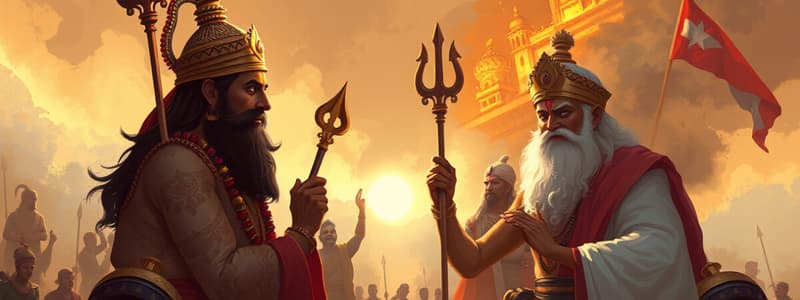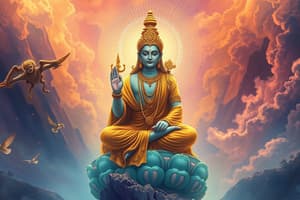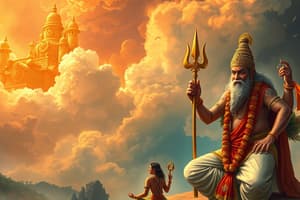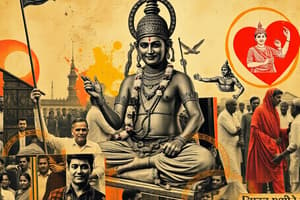Podcast
Questions and Answers
Hindutva is primarily a religious ideology that aligns closely with the ancient practices of Hinduism.
Hindutva is primarily a religious ideology that aligns closely with the ancient practices of Hinduism.
False (B)
The Rashtriya Swayamsevak Sangh, founded in 1925, has strong ties to the Bharatiya Janata Party.
The Rashtriya Swayamsevak Sangh, founded in 1925, has strong ties to the Bharatiya Janata Party.
True (A)
Hinduism is considered a singular tradition with a universally accepted creed.
Hinduism is considered a singular tradition with a universally accepted creed.
False (B)
Both Hinduism and Hindutva share the same ideological underpinnings and religious content.
Both Hinduism and Hindutva share the same ideological underpinnings and religious content.
The relationship between Hinduism as a religion and Hindutva as a political ideology is similar to that between Islam and Islamic fundamentalism.
The relationship between Hinduism as a religion and Hindutva as a political ideology is similar to that between Islam and Islamic fundamentalism.
The rise of the Bharatiya Janata Party in national elections very recently has prompted discussions on the ties between religion and political ideology in India.
The rise of the Bharatiya Janata Party in national elections very recently has prompted discussions on the ties between religion and political ideology in India.
Hindutva has been described in popular literature as 'Hinduism on steroids.'
Hindutva has been described in popular literature as 'Hinduism on steroids.'
Hindu fundamentalism is considered to have a rich and complex religious content, akin to that of Christianity and Islam.
Hindu fundamentalism is considered to have a rich and complex religious content, akin to that of Christianity and Islam.
Hinduism is commonly perceived as a religion that exclusively exists within India.
Hinduism is commonly perceived as a religion that exclusively exists within India.
The four religions of the Indic tradition are Jainism, Buddhism, Christianity, and Islam.
The four religions of the Indic tradition are Jainism, Buddhism, Christianity, and Islam.
The British census operations treated followers of different religions as belonging to multiple identities.
The British census operations treated followers of different religions as belonging to multiple identities.
Indians before British intervention viewed their relationship with various religions in exclusive terms.
Indians before British intervention viewed their relationship with various religions in exclusive terms.
The term 'Hindutva' was created to define Hinduism solely as a religion, separate from culture.
The term 'Hindutva' was created to define Hinduism solely as a religion, separate from culture.
The concepts of karma and dharma are commonly shared among the four Indic religions.
The concepts of karma and dharma are commonly shared among the four Indic religions.
In the secular interpretation, all citizens of India contribute equally to the religious life of the nation.
In the secular interpretation, all citizens of India contribute equally to the religious life of the nation.
Hindutva proponents argue that Hindutva is a subset of Hinduism.
Hindutva proponents argue that Hindutva is a subset of Hinduism.
The modern secular vision of India is enshrined in the Indian Constitution.
The modern secular vision of India is enshrined in the Indian Constitution.
The idea of citizenship in India is based solely on religious identity.
The idea of citizenship in India is based solely on religious identity.
The British concept of religion facilitated a more inclusive understanding of Hinduism.
The British concept of religion facilitated a more inclusive understanding of Hinduism.
Those who support Hindutva often represent it as a cultural identity above religious distinctions.
Those who support Hindutva often represent it as a cultural identity above religious distinctions.
Hindutva and political Hinduism are seen as entirely separate by most Indian liberals.
Hindutva and political Hinduism are seen as entirely separate by most Indian liberals.
Modern Nepalese citizens typically identify only with Hinduism, not Buddhism.
Modern Nepalese citizens typically identify only with Hinduism, not Buddhism.
The territorial concept of India promotes inequality among its religious communities.
The territorial concept of India promotes inequality among its religious communities.
The secular view of Indian history is supported by most Hindu nationalists.
The secular view of Indian history is supported by most Hindu nationalists.
Hindu nationalists believe that the dominance of English in public life is justified.
Hindu nationalists believe that the dominance of English in public life is justified.
Indian liberals view someone who does not know English as potentially undereducated.
Indian liberals view someone who does not know English as potentially undereducated.
Jawaharlal Nehru is viewed differently by Indian liberals and Hindu nationalists.
Jawaharlal Nehru is viewed differently by Indian liberals and Hindu nationalists.
Hindu nationalists advocate for outright rejection of Western civilization.
Hindu nationalists advocate for outright rejection of Western civilization.
There are twenty-two recognized regional languages in India, with Hindi being widely spoken and understood.
There are twenty-two recognized regional languages in India, with Hindi being widely spoken and understood.
Hindu nationalists want to reduce the Hindu influence in Indian society.
Hindu nationalists want to reduce the Hindu influence in Indian society.
The statement that Hinduism is endorsed by nearly 50% of the Indian population is accurate.
The statement that Hinduism is endorsed by nearly 50% of the Indian population is accurate.
Indian liberals and Hindu nationalists agree entirely on the nature of Indian secularism.
Indian liberals and Hindu nationalists agree entirely on the nature of Indian secularism.
The interaction between civilizations mentioned favors the dominant West entirely.
The interaction between civilizations mentioned favors the dominant West entirely.
Hindu nationalists hold the belief that the Hindu religion is practiced by a minority in India.
Hindu nationalists hold the belief that the Hindu religion is practiced by a minority in India.
Hindutva historians believe that Gandhi's nonviolent tactics were the primary reason for the British leaving India in 1947.
Hindutva historians believe that Gandhi's nonviolent tactics were the primary reason for the British leaving India in 1947.
Subhas Chandra Bose formed the Indian National Army (INA) from Indian soldiers who had surrendered to Japan during World War II.
Subhas Chandra Bose formed the Indian National Army (INA) from Indian soldiers who had surrendered to Japan during World War II.
Liberal historians often emphasize the role of armed revolutionary movements in the struggle for Indian independence.
Liberal historians often emphasize the role of armed revolutionary movements in the struggle for Indian independence.
The caste system has consistently been identified as a negative factor in economic development by liberal historians.
The caste system has consistently been identified as a negative factor in economic development by liberal historians.
Maharana Pratap and Shivaji are often celebrated by Hindutva historians for their resistance against Mughal rule.
Maharana Pratap and Shivaji are often celebrated by Hindutva historians for their resistance against Mughal rule.
The Hindutva movement's leadership has always been dominated by brahmins.
The Hindutva movement's leadership has always been dominated by brahmins.
Hindu liberals are generally supportive of making beef consumption a topic of discussion in Indian society.
Hindu liberals are generally supportive of making beef consumption a topic of discussion in Indian society.
Angus Maddison's research indicates that India led the world in global output until 1500.
Angus Maddison's research indicates that India led the world in global output until 1500.
Hindutva historians deny any historical role of resistance against Muslim rule in India.
Hindutva historians deny any historical role of resistance against Muslim rule in India.
Economic decline in India began under British rule according to conventional wisdom.
Economic decline in India began under British rule according to conventional wisdom.
Hindu liberals advocate for a Marxist analysis when discussing caste and social organization.
Hindu liberals advocate for a Marxist analysis when discussing caste and social organization.
Hindu liberals view the caste system as a form of social defense against civilizational challenges.
Hindu liberals view the caste system as a form of social defense against civilizational challenges.
The moment of Indian Independence marked the establishment of a theocratic India.
The moment of Indian Independence marked the establishment of a theocratic India.
Narendra Modi, the current Prime Minister of India, belongs to a caste that was classified just above the former untouchables.
Narendra Modi, the current Prime Minister of India, belongs to a caste that was classified just above the former untouchables.
The language of instruction in most Indian schools is Hindi.
The language of instruction in most Indian schools is Hindi.
Hindu nationalism, as described in the context, emerged from the perceived secular erosion of Indian polity.
Hindu nationalism, as described in the context, emerged from the perceived secular erosion of Indian polity.
Both Hindutva adherents and Hindu liberals agree on the severity of British rule over India.
Both Hindutva adherents and Hindu liberals agree on the severity of British rule over India.
According to the Hindutva school, Muslims ruled India for a shorter period than the British.
According to the Hindutva school, Muslims ruled India for a shorter period than the British.
Mahatma Gandhi is viewed positively by Hindu nationalists mainly for his role in achieving India's independence.
Mahatma Gandhi is viewed positively by Hindu nationalists mainly for his role in achieving India's independence.
Hinduism is characterized as a plural and tolerant religion by the text, allowing other religions to flourish alongside it.
Hinduism is characterized as a plural and tolerant religion by the text, allowing other religions to flourish alongside it.
The terms 'pseudosecularism' and 'diluted Hinduism' refer to the secularism practiced by the Indian National Congress.
The terms 'pseudosecularism' and 'diluted Hinduism' refer to the secularism practiced by the Indian National Congress.
Hindu liberals and Hindutva historians both regard the struggle for Independence as a collaborative effort between Hindus and Muslims.
Hindu liberals and Hindutva historians both regard the struggle for Independence as a collaborative effort between Hindus and Muslims.
Hindu nationalists interpret British rule over India as largely favorable compared to Muslim rule.
Hindu nationalists interpret British rule over India as largely favorable compared to Muslim rule.
The Partition of India is often seen by Hindutva thinkers as a direct consequence of Gandhi's policies.
The Partition of India is often seen by Hindutva thinkers as a direct consequence of Gandhi's policies.
The distinction between the Indian National Congress's secularism and Hindutva's version is mainly ideological.
The distinction between the Indian National Congress's secularism and Hindutva's version is mainly ideological.
Nathuram Godse is remembered by some Hindu nationalists as a heroic figure.
Nathuram Godse is remembered by some Hindu nationalists as a heroic figure.
The term 'asymmetrical secularism' refers to a balance of interests between Hindus and Muslims in modern Indian policy.
The term 'asymmetrical secularism' refers to a balance of interests between Hindus and Muslims in modern Indian policy.
The history of India is characterized by a continuous struggle between Hinduism and Islam, according to Hindutva proponents.
The history of India is characterized by a continuous struggle between Hinduism and Islam, according to Hindutva proponents.
Hindu liberals view Muslims as outsiders to Indian society.
Hindu liberals view Muslims as outsiders to Indian society.
The concept of secularism in India is universally accepted by all political factions.
The concept of secularism in India is universally accepted by all political factions.
Flashcards are hidden until you start studying
Study Notes
Overview of Hinduism and Hindutva
- Hinduism is the most ancient religion of the Indian subcontinent, characterized by pluralism and a lack of a single, defined creed.
- Hindutva, associated with the BJP and RSS, is a political ideology that advocates for Hindu nationalism.
- The relationship between Hinduism and Hindutva has gained significant attention since the BJP rose to power in 1990, especially after electoral successes in 2014 and 2019.
Distinctions Between Religion and Culture
- A key distinction made by Hindutva advocates is between religions that originated in India (Indic religions) and those that did not, such as Christianity and Islam.
- Hindutva posits that Hinduism should be viewed not only as a religion but as a shared culture, countering the British-imposed concept of exclusive religious identities.
- This perspective underscores the shared tenets of karma, dharma, and cultural practices among Indic religions.
Historical Perspectives on Indian Identity
- Secularism views Indian identity territorially, asserting equality among all citizens irrespective of their religions, framed in the Indian Constitution.
- The Hindutva perspective asserts that Hindus, as original inhabitants, have faced historical oppression by Muslim and Christian rulers, and therefore their political self-assertion is justified.
- This ideological divide complicates the narrative of Indian history, with contrasting views on the impact of coexistence between different religious groups.
Divergence in Historical Interpretation
- Hindu liberals view Muslim and British rule as distinct phases, emphasizing joint struggles for Independence against British exploitation.
- Hindutva historians perceive the history of India as a continuous struggle between Hinduism and Islam, viewing British rule as a lesser concern within this context.
- The legacy of Mahatma Gandhi is also interpreted differently; liberals celebrate his nonviolent resistance, while Hindutva nationalists criticize his perceived appeasement of Muslims.
Caste and Economic Perspectives
- Caste is viewed negatively by liberal historians, deemed to obstruct socio-economic progress; Hindutva ideologues consider it a necessary defense mechanism against historical Muslim challenges.
- There is a paradox regarding India’s economic history: despite a hierarchical caste system, India thrived economically until British rule curtailed its growth.
- The contemporary leadership of the Hindutva movement reflects a shift, with prominent leaders from non-brahmin backgrounds, contrasting with the liberal narrative largely represented by upper castes.
Socio-Cultural Issues
- The cow, a significant symbol in Hindu culture, becomes a polarizing issue between Hindu liberals and Hindutva followers, who take a strong stance on cow protection.
- Language also plays a role in the cultural identity debate, with differing opinions on its significance in defining Hindu nationalism and inclusivity.
Summary of Ideological Battles
- The liberal view prioritizes a secular, pluralistic India, while Hindutva proponents emphasize a homogeneous Hindu identity and its political expression.
- There exists a dynamic and contentious engagement between these ideologies, influencing societal and political discussions in contemporary India.### English Language Dominance in India
- English is spoken by approximately 12% of India's population.
- Hindu liberals view English as a unifying factor and vital for national progress in a globalized environment.
- Hindu nationalists criticize the dominance of English, advocating for the prominence of Indian languages in public life.
Linguistic Diversity and Regional Languages
- India recognizes twenty-two regional languages.
- Hindi is spoken by nearly half of the population and is widely understood, especially in northern and central India.
- Resistance to Hindi imposition is notable in southern India, reflecting regional language pride.
Attitudes Towards Education and Language
- Indian liberals consider a lack of English proficiency as a sign of undereducation.
- Hindu nationalists equate knowledge of only English with undereducation, suggesting a different cultural valuation of languages.
Broader Ideological Differences
- Distinctions exist between Indian liberals and Hindu nationalists regarding views on Jawaharlal Nehru, the Indian Constitution, secularism, and economic policies.
- Both groups engage with Western civilization, opting for selective appropriation rather than outright rejection or acceptance.
Hindu Nationalism vs. Indian Liberalism
- Hindu nationalists advocate for an increased Hindu cultural presence, supporting their viewpoint with the notion that about 80% of the population subscribes to Hinduism.
- Indian liberals express concern that expanding Hindu influence could disrupt India's multicultural and multireligious harmony.
Summary of Interaction with Western Civilization
- India's interaction with the West is characterized by three choices: outright rejection, selective appropriation, and outright acceptance.
- Hindu nationalists and Indian liberals both prefer selective appropriation but differ in the extent of the "Hindu" influence they support.
Studying That Suits You
Use AI to generate personalized quizzes and flashcards to suit your learning preferences.




